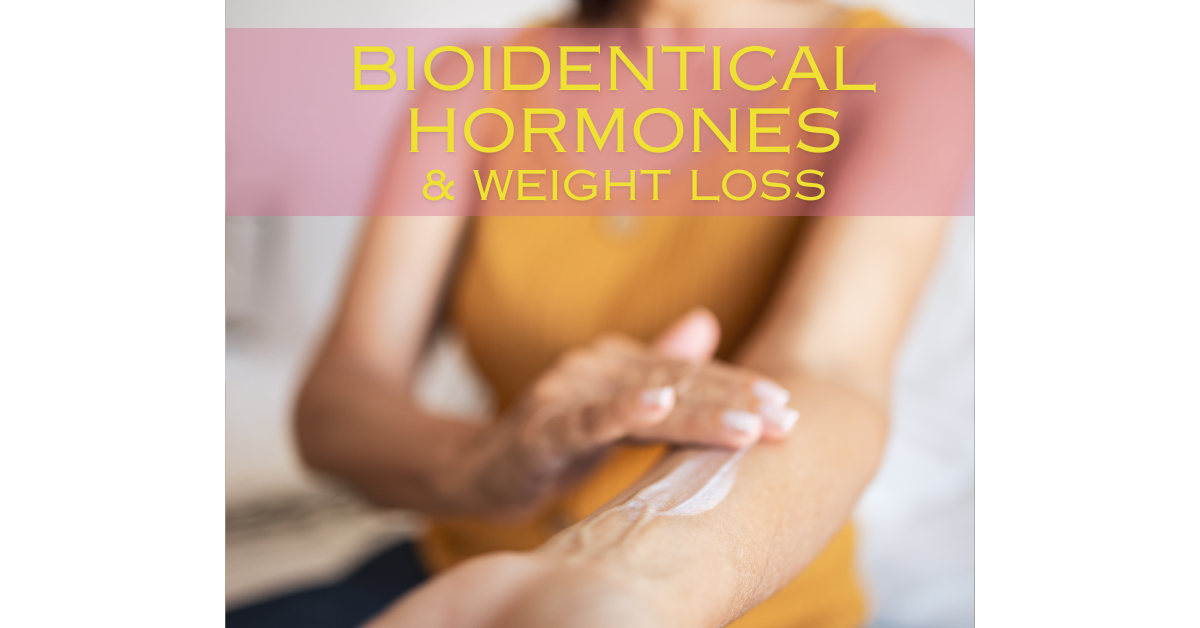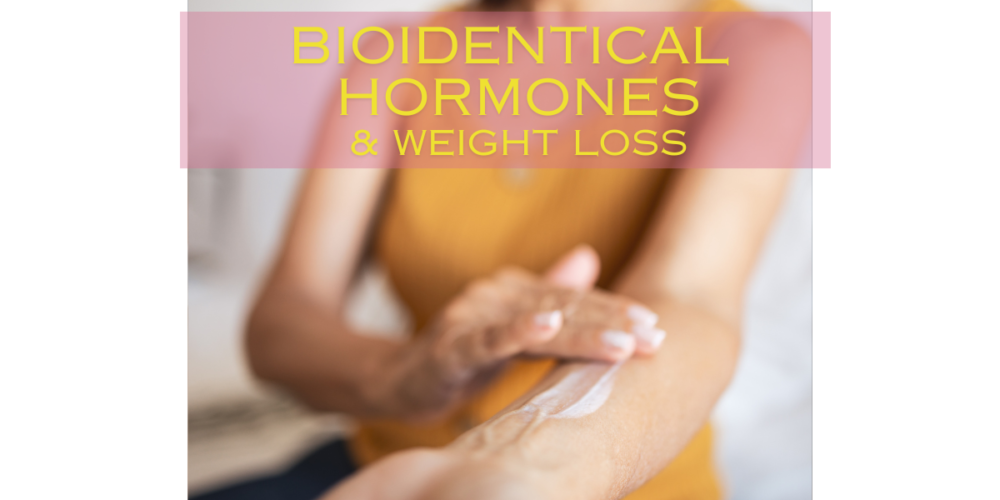This blog is all about weight gain in perimenopause and menopause- and relevant Bioidentical Hormones Weight Loss reviews!

Can Hormone Replacement Help with Weight Loss? Let’s explore Bioidentical Hormones Weight Loss Reviews!
Weight gain can be one of the most common symptoms of perimenopause and menopause. Because of this, many women seek help with weight gain through bioidentical hormone replacement. In this article, we will explore the definition of bioidentical hormone replacement, its working mechanism, and its potential benefits for weight loss.
Can Bioidentical Hormones Really Help with Weight Loss?
If you’re struggling with stubborn weight gain in your 40s and beyond—especially during perimenopause or menopause—you’re not alone. Many women find that despite eating well and exercising, the scale just won’t budge. It’s also common to gain weight during this time, even if you’re not changing your diet or lifestyle.
Hormonal imbalance is often the hidden culprit, and one potential solution to help this and other symptoms of hormone shifts is bioidentical hormone replacement therapy (BHRT). In this blog, we’ll explore how bioidentical hormones may support weight loss, what real women are saying in their reviews, and whether BHRT is a safe, effective option to help restore balance, energy, and a healthier body composition.
What Are Bioidentical Hormones?
Bioidentical hormones are lab-made compounds designed to replicate the structure of hormones your body naturally produces. Most often derived from plant sources like yams or soy, these hormones are chemically made to be identical to human estrogen, progesterone, and testosterone.
Bioidentical hormone replacement therapy (BHRT) is commonly used to restore hormonal balance during perimenopause, menopause, and other hormone-related conditions. It aims to ease symptoms like hot flashes, mood swings, weight gain, fatigue, and low libido—while also supporting long-term wellness goals, including metabolism and body composition.
Why Bioidentical Hormones Are Popular
The demand for BHRT has grown significantly, especially among women seeking more natural or customized alternatives to conventional hormone replacement therapy (HRT). This shift began largely in response to the Women’s Health Initiative study, which raised concerns about the risks of synthetic hormones. In the wake of that research, compounded bioidentical hormones became a popular alternative as classic HRT was taken away from women.
Today, it’s estimated that 1 to 2.5 million women in the U.S. over age 40 use compounded BHRT to address hormone-related symptoms and improve quality of life. Media buzz, recent increased coverage of perimenopause and menopause in social media, and celebrity endorsements have only amplified this popularity.
There is still some debate with conventional healthcare providers regarding the safety of even BHRT, however, and each person must discuss any potential risk with their healthcare provider.
The Connection Between Hormonal Imbalances and Weight
How Hormonal Changes Affect Weight Gain
Hormones act as your body’s chemical messengers, orchestrating everything from metabolism to fat storage. When hormone levels become imbalanced, the effects often manifest as stubborn weight gain that resists traditional diet and exercise efforts.
Several key hormones directly impact your weight:
- Estrogen: Regulates fat distribution and insulin sensitivity
- Progesterone: Influences appetite and water retention
- Testosterone: Helps build lean muscle mass and burn fat
- Thyroid hormones: Control metabolic rate and energy production
- Cortisol: When elevated, promotes abdominal fat storage (check out this blog to learn more)
Not every woman experiences weight gain during menopause, but the average weight gain during perimenopause and beyond is 7-10 pounds.
The Role of Estrogen During Menopause
During the later stages of perimenopause and into menopause, estrogen levels dramatically decline, triggering a cascade of metabolic changes. This hormonal shift often results in increased abdominal fat, even without changes in diet or exercise habits.
Lower estrogen levels can lead to:
- Reduced metabolic rate
- Increased insulin resistance
- Changes in fat distribution (more abdominal fat)
- Loss of muscle mass
- Disrupted hunger and satiety signals
Bioidentical Hormones Weight Loss Reviews
Many women report significant improvements in both weight management and overall quality of life after beginning bioidentical hormone therapy. Patients at my functional medicine practice report to me the following:
- Better ability to build muscle mass, over time leading to improved metabolism and weight loss
- Reduced joint pain, allowing them to return to or begin a comprehensive fitness plan thus indirectly improving weight and overall body composition
- Improved sleep, allowing time for exercise and reducing sugar cravings which aids in weight loss
These testimonials consistently mention improved sleep, enhanced mood, increased energy, and easier weight management as benefits of achieving hormonal balance through BHRT.
All names have been changed for patient privacy.
Case Study: Kelly’s Transformation
Kelly, a 55-year-old patient, provides a compelling example of BHRT’s potential impact on weight management. Prior to treatment, she struggled with classic menopausal symptoms, including hot flashes, night sweats, mood swings, and a 25-pound weight gain that seemed resistant to all interventions.
After comprehensive hormone and functional medicine testing revealed significant imbalances, Kelly began a personalized BHRT protocol, diet, exercise, and supplement plan at HHW. Within six months, she reported:
- Weight loss of 15 pounds
- Significant reduction in hot flashes and night sweats
- Improved sleep quality
- Increased energy for exercise
- Better mood
- Less sugar cravings
Case Study: Sarah’s BHRT experience
Sarah, a 48-year-old patient, found she was dealing with weight gain in perimenopause related to estrogen dominance (for more on estrogen dominance and weight gain, check out this blog). Her symptoms included weight gain, waking up at 3 a.m. every night unable to fall back asleep, and extreme PMS type mood changes.
After comprehehnsive testing and starting BHRT progesterone, lifestyle change steps, and supplemental support she reported:
- A 10# weight loss mainly composed of abdominal/truncal fat
- Sleep problems resolved
- Mood swings improved
- Energy improved
- Fitness levels and body composition overall improved
Safety and Efficacy of Bioidentical Hormones
Comparing Bioidentical Hormones to Traditional Hormone Therapy
When comparing bioidentical hormones to traditional hormone therapy, several key differences emerge. Bioidentical hormones are often marketed as being more natural and having fewer side effects, though research is not as robust in these medications as they are often compounded and/or don’t have the large research budgets of major pharmaceutical backers.
Here are some standout differences:
- Molecular structure: Bioidentical hormones exactly match human hormones, while traditional synthetic hormones may have slight structural differences
- Customization: BHRT is often individually compounded based on hormone testing, whereas traditional HRT typically comes in standardized doses
- Administration methods: BHRT offers multiple delivery options including pellets, creams, and troches, while traditional HRT is usually available as pills or patches
The Mayo Clinic notes that “despite claims, there’s no evidence that bioidentical hormones are safer or more effective than traditional hormone therapy”. However, if you dig into research, there are some definite risks with synthetic hormones, i/e, classic HRT. The main issue being progestin, a synthetic progesterone found in traditional HRT.
Why Bioidentical Hormones May Be Better Tolerated and Safer
Many women report feeling better—and experiencing fewer side effects—when using bioidentical hormone replacement therapy (BHRT) compared to conventional hormone treatments. One key reason is the use of bioidentical progesterone rather than synthetic progestins.
While both are intended to balance estrogen and protect the uterine lining, bioidentical progesterone has a very different molecular structure and action in the body. Unlike synthetic progestins, which may increase the risk of breast cancer and negatively affect cardiovascular health, bioidentical progesterone has been associated with a reduced risk of breast cancer in some observational studies. It also tends to be better tolerated, with fewer mood-related side effects, making it a preferred choice among many patients and practitioners.
Another component often used in BHRT formulations—estriol (E3)—is considered a gentler estrogen. Though weaker than estradiol (E2), it offers unique benefits, particularly for vaginal and urinary symptoms, and may carry a lower theoretical risk of breast tissue stimulation. This type of estrogen can be found in the compounded topical BHRT called bi-est, or in variations of this from compounding pharmacies.
Regulatory Concerns and FDA Oversight
A significant distinction between bioidentical and traditional hormone therapies lies in their regulatory oversight. While FDA-approved bioidentical hormone products exist (the only options are the estradiol patch and the progesterone pill Prometrium), many patients receive custom-compounded formulations that aren’t FDA approved.
As a practitioner who also prescribes BHRT from compounding pharmacies, I take great care in the pharmacies I choose. Here’s what I look for in a compounding pharmacy:
State Licensing and Pharmacy Board Oversight
Every compounding pharmacy must be licensed through its state’s Board of Pharmacy. In Colorado, for example, the State Board of Pharmacy conducts routine inspections of both sterile and non-sterile compounding operations. These inspections cover:
-
Proper equipment use and calibration
-
Sterile cleanroom environments (for injectables or vaginal preparations)
-
Ingredient sourcing and storage
-
Recordkeeping, labeling, and expiration date protocols
-
Personnel training and hygiene standards
These inspections are designed to ensure that compounded hormones meet strict safety and quality guidelines—similar to those of traditional pharmacies. I always make sure any compounding pharmacy I prescribe through is up to date and has met and exceeded the above standards.
Federal Regulation and the Role of the FDA
Compounding pharmacies are also regulated at the federal level under the Drug Quality and Security Act (DQSA). There are two main types:
-
503A Compounding Pharmacies: These make patient-specific prescriptions based on a licensed healthcare provider’s order. They are regulated primarily by the state board but must also follow federal compounding standards.
-
503B Outsourcing Facilities: These compound medications in larger batches (not patient-specific) and are registered with the FDA. They undergo regular FDA inspections and must comply with Good Manufacturing Practices (cGMP)—similar to pharmaceutical manufacturers.
If your BHRT provider sources your prescription from a 503B facility, it means that medication is produced under especially rigorous standards for sterility, stability, and potency.
Voluntary Accreditation: A Sign of Excellence
In addition to required inspections, many high-quality compounding pharmacies choose to pursue voluntary accreditation through organizations such as:
-
PCAB (Pharmacy Compounding Accreditation Board)
-
NABP (National Association of Boards of Pharmacy)
These accreditations involve third-party audits, internal quality controls, staff training requirements, and documentation reviews that go above and beyond minimum regulations. When a pharmacy is PCAB- or NABP-accredited, it’s a strong indicator of quality, consistency, and safety.
Future Trends in Bioidentical Hormone Therapy
Growing Demand for BHRT
The demand for bioidentical hormone replacement therapy continues to grow despite ongoing debates about efficacy and safety. This trend reflects broader shifts toward personalized medicine and patient-centered care.
Several factors are driving this increasing interest:
- Growing awareness of hormonal health’s impact on overall wellbeing
- Patient preference for treatments perceived as more natural, or more individualized (women are not one-size-fits-all beings)
- Expanding research into hormonal influences on aging and metabolism
- Integration with newer weight management approaches like GLP-1 agonists
Expert Opinions on BHRT and Weight Management
Medical experts remain divided on the role of BHRT in weight management, but the tides are turning. While many practitioners report positive clinical outcomes, others emphasize the need for more rigorous research.
Some experts suggest that hormone therapy alone isn’t a weight loss solution but rather addresses an underlying barrier that, when corrected, allows traditional weight management approaches to work more effectively. I would fall into this camp as I don’t see BHRT as a sure-thing with weight loss, just part of the tool kit for women that are also experiencing significant perimenopause or menopause related symptoms.
In fact, some women report weight gain with both BHRT and traditional HRT. This further emphasizes the need for a close relationship with a knowledgeable healthcare provider who can individualize and adjust a program tailored to you.
The Wrap-up
Bioidentical hormone replacement therapy shows promise for addressing weight challenges related to hormonal imbalances, particularly during menopause. While many bioidentical hormones weight loss reviews and clinical experiences often report positive outcomes, including weight loss, scientific evidence remains limited.
For women struggling with menopausal weight gain, BHRT may offer a pathway to hormonal balance that supports weight management efforts. However, it’s essential to approach this therapy with realistic expectations and under proper medical supervision. It’s also important to understand it won’t be effective for weight loss if not paired with a supportive diet and fitness plan.
The decision to pursue BHRT should involve thorough discussion with a qualified healthcare provider, comprehensive hormone testing, and consideration of your complete medical history. When properly prescribed as part of a holistic approach that includes healthy diet, regular exercise, and stress management, BHRT may help create the metabolic conditions that support achieving and maintaining a healthy weight.
This blog was all about Bioidentical Hormones Weight Loss Reviews, impacts, safety, and more!
You may also enjoy:
Perimenopause Weight Gain – Including 5 Tips to Manage Symptoms
Weight Gain in Perimenopause: Hormones and Weight Gain after 40
Nutrition for Perimenopause: Top 13 Foods to Eat for Healthy Hormones!

Dr. Shelley Meyer is a board-certified family physician and Institute of Functional Medicine-certified functional medicine physician, as well as a Registered Dietitian. She is passionate about helping women navigate the roller coaster of perimenopause and postmenopause. She has her own Functional Medicine Practice in Denver, Colorado.





Leave a Reply
You must be logged in to post a comment.